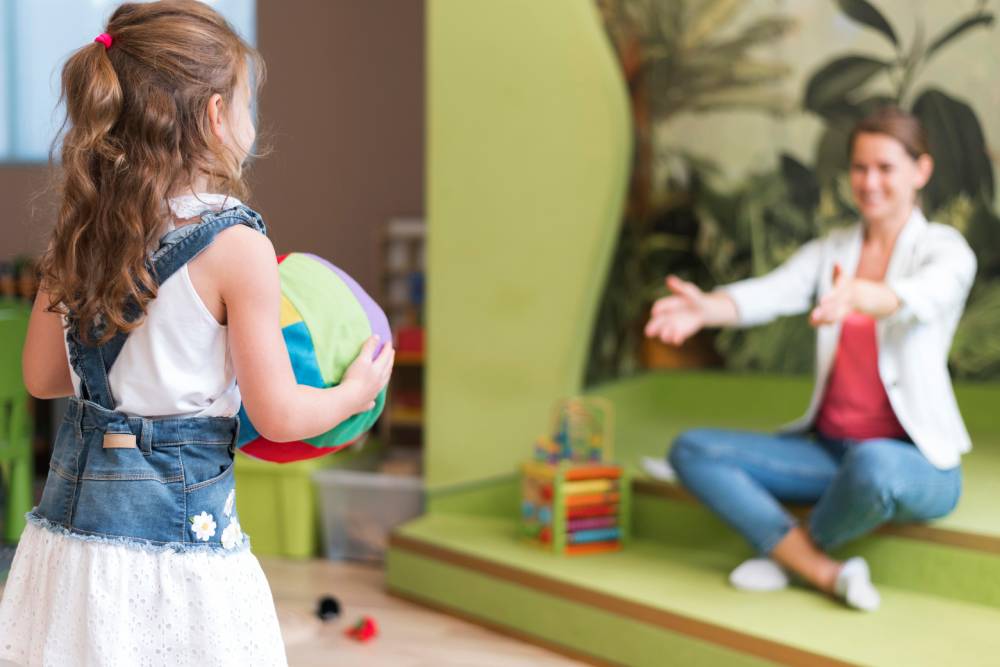School readiness is more than just knowing the alphabet or counting numbers. In fact, it involves a combination of physical, emotional, and cognitive skills that help children transition smoothly into an academic environment. For children who face challenges in these areas, occupational therapy plays an essential role. Indeed, occupational therapy provides the tools necessary to develop the foundational skills that will help children become ready for school.
Understanding School Readiness
School readiness is often thought of in terms of academic skills like reading and math. However, it also involves a child’s ability to handle the social, emotional, and sensory demands of a school environment. School readiness can be broken down into several key areas:
- Physical Skills: Fine and gross motor skills, such as holding a pencil, using scissors, and participating in physical activities.
- Social and Emotional Skills: The ability to interact with peers and manage emotions in a classroom setting.
- Cognitive Skills: Basic thinking, problem-solving, and memory skills needed for learning.
- Self-Regulation: The ability to manage one’s behavior, emotions, and attention.
Each of these areas plays a critical role in a child’s successful transition into the school environment. Occupational therapy focuses on developing these skills in a way that is tailored to each child’s needs.
The Importance of Occupational Therapy in School Readiness
Occupational therapy plays a crucial role in developing skills children need to succeed in school. It focuses on improving motor, sensory, cognitive, and social skills, helping children build confidence and independence in the classroom.
- Enhancing Fine and Gross Motor Skills
Occupational therapy targets both fine and gross motor skills. Fine motor skills like holding a pencil and using scissors are essential for tasks such as writing and drawing. Therapists help children improve hand-eye coordination and finger dexterity through various activities.
Gross motor skills, such as running and balancing, are necessary for physical activities in school. Children who struggle with these skills may find gym class or recess challenging. Occupational therapists use exercises to strengthen these skills and ensure children are ready for school activities.
Addressing Sensory Needs
Every child processes sensory information differently. Some may be sensitive to certain sounds or textures, while others may seek sensory input. Occupational therapists teach children how to manage these sensory experiences and adapt to the school environment. They use sensory integration techniques, like deep pressure activities, to help children calm down in overwhelming situations.Developing Social and Emotional Skills
School requires children to interact with peers and teachers. Social and emotional skills, such as taking turns and following instructions, are essential. Occupational therapy helps children develop these skills and learn how to manage emotions. Therapists teach coping strategies to ensure children feel confident in social settings and are emotionally ready for school.Improving Cognitive and Problem-Solving Skills
Cognitive skills, such as attention and problem-solving, are key for school success. Occupational therapists use games and activities to help children focus, follow instructions, and solve problems. These activities build memory and attention span, making it easier for children to stay on task and interact in group activities.
Preparing Every Child for a Successful Academic Journey
The role of occupational therapy in school readiness is essential for every child. It ensures that all children—regardless of challenges—are equipped with the skills needed for academic success. By addressing physical, sensory, social, emotional, and cognitive skills, occupational therapy prepares children for the diverse experiences they will encounter in school.
- Customized Intervention Plans
Every child has unique needs. Occupational therapists design customized intervention plans that focus on specific areas of development. For example, if a child struggles with fine motor skills, the therapist will incorporate activities that strengthen hand-eye coordination. These personalized plans allow children to progress at their own pace, helping them build the skills necessary for a smooth transition into school. - Fostering Independence
Occupational therapy emphasizes the development of independent living skills. By the time children are ready for school, they should be able to dress themselves, use the bathroom independently, and manage personal belongings. Therapists work on these self-help skills, preparing children to be as independent as possible when they enter the classroom. - Collaboration with Parents and Teachers
Occupational therapy is most effective when there is collaboration between therapists, parents, and teachers. Parents can reinforce the skills learned in therapy at home, while teachers can support the child in the school setting. By working together, everyone involved in a child’s development can ensure the child is fully prepared for school.


How Occupational Therapy Supports School Readiness for Children with Diverse Needs
Children with developmental delays or challenges may require more intensive support to be ready for school. Occupational therapy provides the individualized attention they need to catch up to their peers. Whether a child is dealing with ADHD, sensory processing issues, or learning difficulties, occupational therapy can provide the tools needed for school readiness.
Therapists often work in a collaborative environment with other professionals, such as speech therapists and psychologists, to provide comprehensive support. This multi-disciplinary approach ensures that every aspect of a child’s development is addressed. The goal is to help the child feel confident and competent when entering school, setting them up for long-term success.
Conclusion
The transition to school can be a challenging experience for any child. However, with the right support, it can also be a rewarding and empowering time. Occupational therapy plays a vital role in preparing children for this new chapter in their lives. By focusing on key areas such as motor skills, sensory processing, emotional regulation, and cognitive abilities, occupational therapists help children develop the skills needed for school success.
Preparing every child for a successful academic journey requires a holistic approach, and occupational therapy is at the forefront of this effort. With personalized therapy plans and collaborative efforts between therapists, parents, and teachers, children can thrive in the school environment and beyond.
